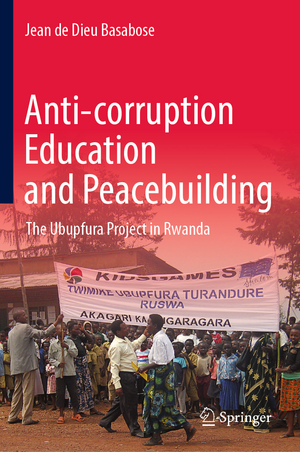Anti-corruption Education and Peacebuilding: The Ubupfura Project in Rwanda
Autor Jean de Dieu Basaboseen Limba Engleză Hardback – 19 mar 2019
Preț: 400.26 lei
Nou
Puncte Express: 600
Preț estimativ în valută:
76.59€ • 80.18$ • 63.37£
76.59€ • 80.18$ • 63.37£
Carte tipărită la comandă
Livrare economică 07-21 aprilie
Preluare comenzi: 021 569.72.76
Specificații
ISBN-13: 9783030033644
ISBN-10: 3030033643
Pagini: 301
Ilustrații: XX, 354 p. 36 illus., 28 illus. in color.
Dimensiuni: 155 x 235 mm
Greutate: 0.7 kg
Ediția:1st ed. 2019
Editura: Springer International Publishing
Colecția Springer
Locul publicării:Cham, Switzerland
ISBN-10: 3030033643
Pagini: 301
Ilustrații: XX, 354 p. 36 illus., 28 illus. in color.
Dimensiuni: 155 x 235 mm
Greutate: 0.7 kg
Ediția:1st ed. 2019
Editura: Springer International Publishing
Colecția Springer
Locul publicării:Cham, Switzerland
Cuprins
Part I. General Introduction.- Chapter 1. Introduction, Research Objectives and Overview.- Part II. An Overview of Corruption: The Concept of Corruption and Conventional Anti-corruption Measures.- Chapter 2. The Concept of Corruption.- Chapter 3. Conventional Anti-corruption Measures.- Part III. The Nexus Between Anti-corruption and Peacebuilding.- Chapter 4. Anti-corruption Measures and Peacebuilding.- Part IV. Research Methods.-Chapter 5. Research Approach, Research Design and Data Collection.- Part V. Exploration of the Rwandan Context and Ace as an Alternative.- Chapter 6. The Rwandan Context.- Chapter 7. Anti-corruption Education as an Alternative Approach
to Corruption.- Part VI. Data and Analysis on the Proposed ace.- Chapter 8. Anti-corruption Education: Ubupfura Model.- Chapter 9. Evaluation of Nibakurane Ubupfura Teachings.- Part VII. Conclusion.- Chapter 10. Summary and Conclusions.- Bibliography.- Appendices.- Durban University of Technology.- International Centre of Nonviolence (ICON).- About the Author.
to Corruption.- Part VI. Data and Analysis on the Proposed ace.- Chapter 8. Anti-corruption Education: Ubupfura Model.- Chapter 9. Evaluation of Nibakurane Ubupfura Teachings.- Part VII. Conclusion.- Chapter 10. Summary and Conclusions.- Bibliography.- Appendices.- Durban University of Technology.- International Centre of Nonviolence (ICON).- About the Author.
Textul de pe ultima copertă
This study explores corruption in Rwanda and highlights the necessity of developing anti-corruption education as a way of combating corruption. It argues that an effective campaign against corruption should consider promoting anti-corruption education with the aim of enabling present and future generations to maintain and live out the Ubupfura (meaning "trust/respect") ethical values. Considering the link between anti-corruption and peacebuilding efforts, as explained in this study, it is underlined that continuous efforts to raise such generations could undoubtedly move Rwandan society toward a sustainable peace. Peacebuilders, anti-corruption agents, and public policymakers are the primary beneficiaries of the study.
Caracteristici
Explores how corruption has increasingly become a challenging issue that undermines peacebuilding processes Demonstrates the involvement of children not only as beneficiaries of an anti-corruption education but as an anti-corruption agent, which is an innovation on the African continent Offers a timely and attractive read in light of the relevance of the anti-corruption education on the African continent and the use of cultural resources
